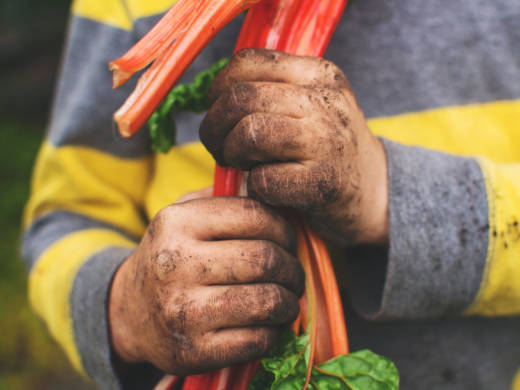Some of the main things are over-sterilizing their environment, keeping their children from ever getting dirty. So going out into the backyard and playing in the mud, and then as soon as they're filthy, bringing them in and sterilizing their hands with antiseptic wipes, and then making sure that none of the dirt gets near their faces. Also, keeping them away from animals. The dogs and cats, sure, but also, other animals. It's fine to wash their hands if there's a cold or a flu virus around, but if they're interacting with a dog, and the dog licks their face, that's not a bad thing. In fact that could be extremely beneficial for the child's health.
What about hand sanitizer? Good or bad?
Usually bad. Hot, soapy water is fine. Even mildly warm, soapy water is fine, and it's probably less damaging to the child's overall health.
How about the five-second rule? The idea that if something falls on the ground and is there for under five seconds, it's clean.
The five-second rule doesn't exist. It takes milliseconds for microbes to attach themselves to a sticky piece of jammy toast, for example. But it makes no difference. Unless you dropped it in an area where you think they could be a high risk of extremely dangerous pathogens, which in every modern American home is virtually impossible, then there's no risk to your child.
Wash a pacifier or lick it if it falls on the ground?
Lick it. A study of over 300,000 children showed that parents who licked the pacifier and put it back in — their kids developed less allergies, less asthma, less eczema. Overall, their health was stronger and more robust.
Are things like allergies an unintended consequence of trying to protect our kids too much?
Absolutely. In the past, we would have eaten a lot more fermented foods, which contain bacteria. We would have allowed our children to be exposed to animals and plants and soil on a much more regular basis. Now we live indoors. We sterilize our surfaces. Their immune systems then become hyper-sensitized. You have these little soldier cells in your body called neutrophils, and when they spend too long going around looking for something to do, they become grumpy and pro-inflammatory. And so when they finally see something that's foreign, like a piece of pollen, they become explosively inflammatory. They go crazy. That's what triggers asthma and eczema and often times, food allergies.
Give us some advice. What should I allow my child to do?
Oftentimes, it's hard to get your kid to eat a healthy diet. I would strongly try to encourage the consumption of more colorful vegetables, more leafy vegetables, a diet more rich in fiber as well as reducing the sugar intake. But just generally, allow your kid to experience the world. As long as they're properly vaccinated, there's no threat, and they will actually get a stronger, more beneficial exposure.
Jordana Hochman, Lucy Perkins, Ned Wharton and Sophia Boyd produced and edited this interview for broadcast, and Andrea Hsu adapted it for the Web.
Copyright 2017 NPR. To see more, visit http://www.npr.org/.
9(MDAxOTAwOTE4MDEyMTkxMDAzNjczZDljZA004))



9(MDAxOTAwOTE4MDEyMTkxMDAzNjczZDljZA004))